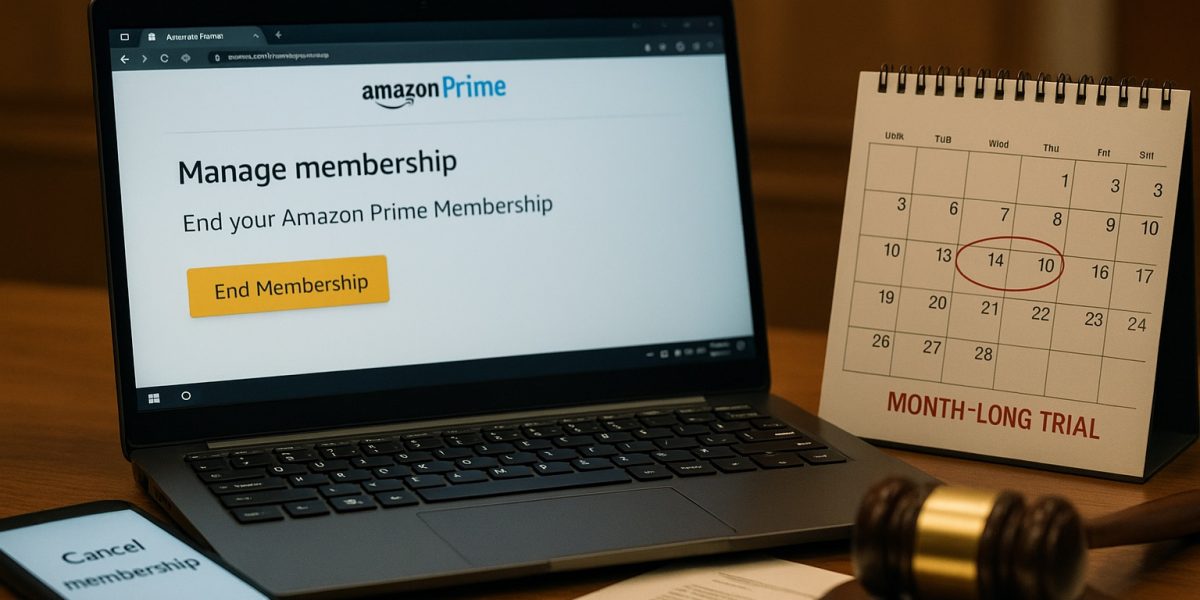Amazon heads to federal court in Seattle starting Monday to defend its Prime membership program against claims it deceived tens of millions of customers into signing up and then made it needlessly difficult to cancel.
The Federal Trade Commission alleges Amazon used “dark patterns” – sneaky design tricks – to push users into Prime memberships they didn’t want or understand. Once subscribed, customers faced intentional obstacles when trying to cancel.
This marks the first major trial against Amazon in recent history, though the company faces a separate antitrust case set for 2027.
What the FTC Claims Amazon Did Wrong
The government alleges Amazon violated consumer protection laws by deceiving people about Prime’s sign-up and cancellation process.
Specific allegations:
- Used design tricks to get unwanted Prime sign-ups
- Collected billing information before revealing membership terms
- Made cancellation deliberately difficult
- Delayed improvements that would help customers cancel but hurt Amazon’s revenue
Judge John Chun already ruled that Amazon violated the Restore Online Shoppers’ Confidence Act (ROSCA) by taking customer payment details before disclosing what Prime membership actually involved.
The judge also found that Amazon executives could face personal liability if violations are proven during trial.
Amazon’s Defense
Amazon denies breaking any laws. Company spokesperson Heather Layman called the FTC’s claims “false on the facts and the law” when the case was filed in 2023.
“The truth is that customers love Prime, and by design we make it clear and simple for customers to both sign up for or cancel their Prime membership,” Amazon stated.
The company did simplify its European cancellation process in 2022 after regulatory pressure there.
The Broader Context: Subscription Crackdowns
Going after difficult subscription cancellations has become bipartisan policy. Both Republicans and Democrats support making it easier for consumers to quit recurring services.
Former FTC Chair Lina Khan pushed a “click-to-cancel” rule requiring cancellation to be as easy as signing up. That rule was struck down by an appeals court, but enforcement actions continue.
Recent subscription enforcement:
- Current FTC leadership continues the Amazon case despite leadership changes
- New lawsuit filed against Uber over its Uber One subscription cancellation process
- Broader push for subscription transparency across the industry
What This Trial Means for Prime Users
The trial outcome could change how Amazon handles Prime memberships, potentially making sign-up clearer and cancellation easier.
Potential impacts:
- Simpler cancellation processes
- Clearer disclosure of membership terms
- Changes to sign-up flow design
- Possible refunds for affected customers
The case represents part of the government’s broader effort to rein in Big Tech practices that allegedly harm consumers.
Trial Timeline and Stakes
Jury selection begins Monday, followed by opening arguments. The trial is expected to last roughly a month.
If the FTC proves its case, Amazon could face significant penalties and be required to change its Prime practices. The personal liability ruling means individual executives could also face consequences.
The trial represents a test case for how courts will handle allegations of deceptive design practices by major tech companies.




Post a comment